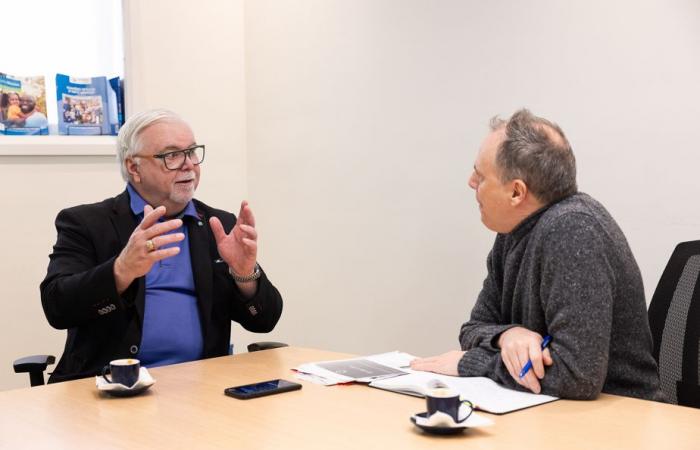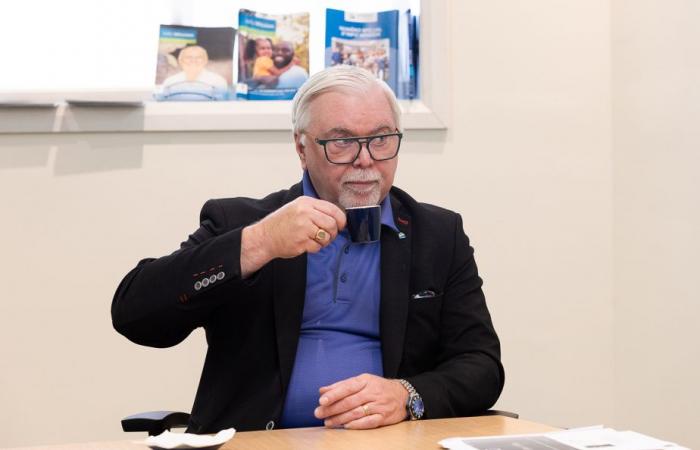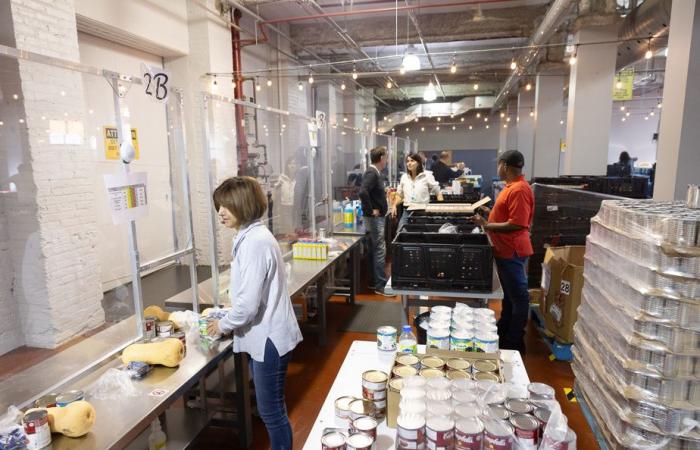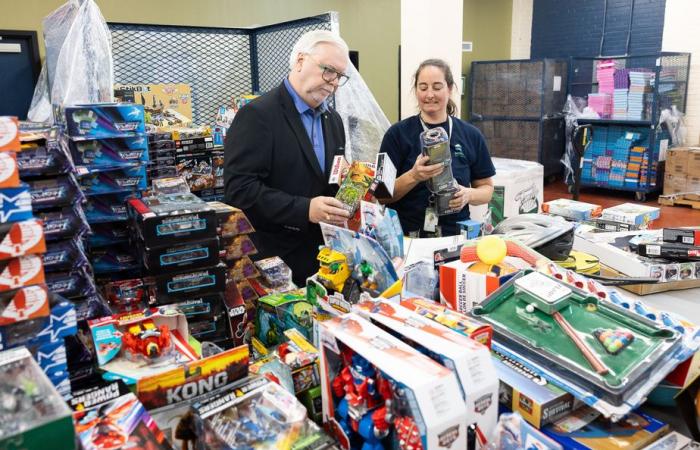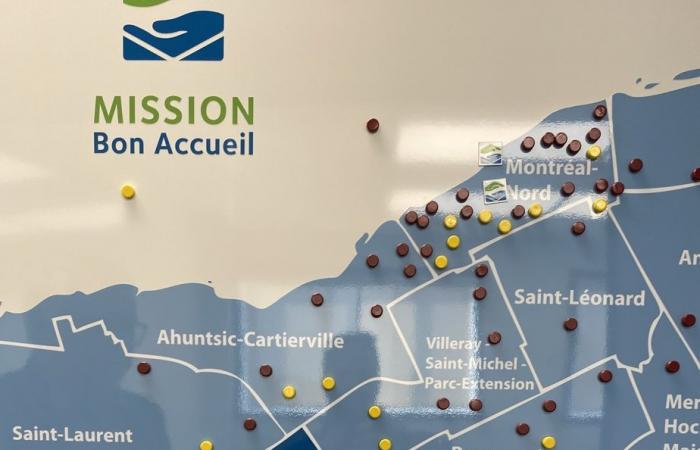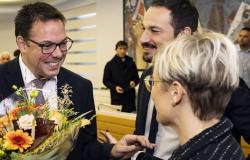For eight years, Samuel Watts has directed Mission Bon Accueil, “the largest gateway to supporting Montrealers in need.” Each month, approximately 10,000 people experiencing homelessness, poor families and young people in difficulty use one of its programs or services. As the holidays approach, The Press went for coffee with the CEO of the aid organization.
Published at 5:00 a.m.
Instead of meeting in a café in Saint-Henri, near his office, Samuel Watts wanted to show us around the owner of the Mission Bon Accueil (MBA) headquarters. “There is an espresso machine in our meeting room. We’ll go and chat there. » We did not regret his invitation. The place is teeming with employees and volunteers. Its food bank warehouse looks like a Costco, and there’s even a dental clinic in partnership with McGill University.
A consultant for 30 years in the private sector, particularly for the pharmaceutical industry, the CEO – whom everyone calls Sam – has a very friendly face. An English speaker from West Island perfectly bilingual, very attached to the metropolis and its institutions. Moreover, if he accepted his position in 2016, after being surveyed by a headhunter, it was partly because his wife reminded him that the organization is older… than the Montreal CH. It was founded in 1892.
But the real reason is his desire to change mentalities in the field of philanthropy in the country.
It’s very complex, managing Mission Bon Accueil. To motivate my staff, I must have the discipline of a boss of a for-profit company, with the flexibility of a manager of an NPO. And make sure we all work as a team; not as a collective of individuals.
Samuel Watts, CEO of Welcome Hall Mission
Excellence serving the most vulnerable
At first glance, Samuel Watts sounds more like a manager than a community worker. He is even critical of the environment which, according to him, does not always aim for excellence. “People in the community sector do a good job. It is the service model, based on charity, that is not good. Giving for the sake of giving, as with food drives, is ineffective. Because it perpetuates the cycle of poverty by creating dependence on food security. »
PHOTO MARTIN TREMBLAY, THE PRESS
“Is it wise to allocate care for vulnerable people in society to under-equipped and poorly resourced community service groups? », asks Samuel Watts.
The housing crisis
In his opinion, charities are underfunded and doing what they can. “Is it wise to allocate care for vulnerable people in society to under-equipped and poorly resourced community service groups? I’m not talking about us [le budget annuel de MBA, qui peut varier, est de 33 millions, et l’organisme a 150 employés]. But 90% of NPOs in the community sector with a budget of less than 2 million. With this money, you can’t do much. »
In Canada, the most deprived are supported by organizations caught in a never-ending cycle of poverty.
Samuel Watts, CEO of Welcome Hall Mission
In the current economic context, can we return to the welfare state? Doesn’t government aid also have limits? “There is a certain personal responsibility. It’s clear. But I believe that we judge a society by the way it treats its poor. The problem we have with affordable, permanent housing is not new. It dates back 40 years: when the federal government withdrew to leave the construction of social housing to the private sector. »

PHOTO MARTIN TREMBLAY, THE PRESS
Part of the Mission Bon Accueil food bank, in Saint-Henri
“A problem must have an owner”
According to him, everyone is worried and concerned about poverty, but no one is responsible. “To solve a problem, someone has to own it,” he says. Is the housing and homelessness crisis a federal problem? Nope. Provincial, municipal? Maybe. From the health network? Everyone passes the buck. Instead of sitting down together to come up with a plan and solutions. »
Samuel Watts likes to tell business leaders that, unlike them, the success of his business is when he loses customers. “However, for vulnerable people to get off the grid, governments must not just put plasters in each budget. We must understand the cause of poverty, in order to restore a sense of dignity to poor people. »
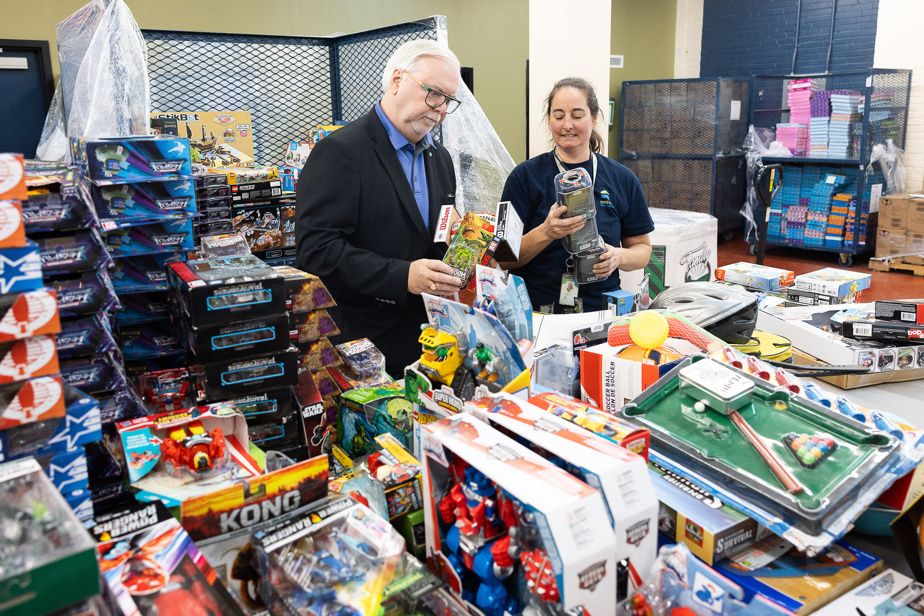
PHOTO MARTIN TREMBLAY, THE PRESS
During the organization’s annual toy distribution, children can choose the gift they want.
For example, for his “Christmas for All” event, Samuel Watts wanted each child to be able to choose their own gift. “Because poverty is often the inability to make choices. Choosing your meal, your job, your home… People who have lost their homes are often linked to job loss, family breakdown, and social isolation.
— And mental health problems, drug addiction? we ask him.
— Also, but it’s not a cause, it comes with it, he replies. I often say that if drug addiction were the cause of homelessness, half of the residents of Beaconsfield would be homeless,” illustrates this resident of the municipality.
The concentration of poverty
“I sit on the National Housing Council of Canada. I have a North American perspective on the current crisis. In Montreal, it’s manageable. We are capable of making a difference. Statistics show that the higher a city has a high average rent rate, the more homelessness there is. And vice versa. »

PHOTO LUC BOULANGER, THE PRESS
The distribution of Mission Bon Accueil services, suppliers and counters on the island of Montreal
“Living in a very precarious situation eats away at your energy. The sense of human dignity is also eroding. Our body cannot restore dignity, but it can help people regain this feeling by being useful and creative in their lives. »
“When a person enters the emergency shelter for the first time, they are asked two questions. Why are you here? What can be done to help you get permanent housing? And we’re getting there… one person at a time. »
UNFILTERED QUESTIONNAIRE
Your coffee ritual: I start my day with two or three good espressos. I sometimes take another one when I’m at my desk.
If you had a donation, it would be… I have the ability to walk into any business or organization and visualize opportunities for improvement. This helped me identify elements that can improve the way a customer experiences an interaction with an organization that provides products or services. This “gift” has served me well in this sector because our ecosystem, which provides care to the most vulnerable, often resists self-examination.
A memorable read: I have read several hundred books on leadership challenges. A book that has had a huge impact is Executionby Larry Bossidy and Ram Charan. I read it in 2003 and learned to challenge myself to focus on the discipline of implementation – something at which most organizations consistently fail.
A person who inspires you: Nelson Mandela – his relentless pursuit of justice and refusal to seek revenge after years of incarceration is a great inspiration to me.
If you could bring together personalities, dead or alive, around the same table, to ask them questions, who would you invite? I might invite people who have worked on policy-adjacent issues and therefore have had significant policy impact. These people were initially considered a little crazy, but they had a major impact. People like Moses, Plato, Leonardo Da Vinci and Louis Pasteur.
Who is Samuel Watts?
- Born May 8, 1961 in Verdun.
- Management consultant for several years, particularly in the medical and pharmaceutical sector.
- President and CEO of Mission Bon Accueil in Montreal since 2016. The aid organization against homelessness and poverty has a presence spread across the island of Montreal in 8 buildings, with 150 employees and 400 volunteers.
- He is also a columnist for the monthly newspaper The Montrealer and the author of Good Work Done Bettera book that offers new ways of thinking in the community sector.
What do you think? Express your opinion

